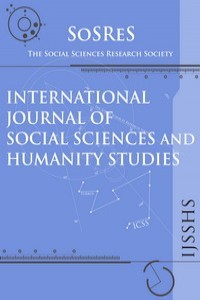DOES FLAPPING OF A BUTTERFLY IN AMAZON FORESTS CAN CAUSE A STORM IN USA? CHAOS THEORY AND A DISCUSSION IN ACCORDANCE WITH BUTTERFLY EFFECT
DOES FLAPPING OF A BUTTERFLY IN AMAZON FORESTS CAN CAUSE A STORM IN USA? CHAOS THEORY AND A DISCUSSION IN ACCORDANCE WITH BUTTERFLY EFFECT
Chaos Theory, Butterfly Effect, Knowledge Age, Globalization,
___
- DERELİ Turkay, Alptekin Durmusoğlu, Senol Kana (2006) ,“Chaos Management in Businesses”, Journal of İstanbul Kultur University,2006/3,p.2
- GÜRSAKAL Nemci, (2007). Social Science Chaos and Complexity, Nobel Publishing, Ankara.
- Koçel, T (2003) Business Management, 9. Press, Istanbul: Beta Press Publishing.
- Horgan, J. (2003) The End Of Science: Facing The Limits Of Knowledge In The Twilight Of The Scientific Age (Translater: A. Ergenç), Istanbul: Gelenek Publishing.
- Marshall, I. and D. Zohar (2003) Who’s Afraid of Schrödinger’s Cat?A
- Dictionary of the New Scientific Ideas (Translator: O. Düz), 3. Press ,Istanbul: Gelenek Publishing. PROGOGİNE Ilya, STENGERS Isabelle (1998). Order out of Chaos, Translator;
- Senai Demirci, Iz Publishing, 2.Press, Istanbul. Singh, H. ve A. Singh (2002) “Principles of Complexity and Chaos Theory in
- Project Execution: A New Approach to Management”, Cost Engineering 44,12: 33, December. SIMSEKER Melih , UNSAR Sinan (2009) “Process of Globalization and Leadership ” Journal Of Yasar University,3(9), 1029-1045.
- TOFFLER Alvin (1992). The New Powers New Shocks, Translator. Belkıs
- Corakcı, Altın Kitaplar Publishing, Istanbul. PASCALE Richard (2004). http://thesius.emeraldingsight.com/vl=6197455/cl=64/nw=1Irpsv/now/spotlight.ht m
- Başlangıç: 2009
- Yayıncı: Sosyal Bilimler Araştırmaları Derneği
YOUNGSTERS AND SOCIAL POLICIES OF SUPPORT DURING CRISIS
Gheorghiţa Nistor, Mirela Anghel
THE CAUSES AND THE ECONOMIC IMPACT OF IMMIGRATION: EMPIRICAL EVIDENCE FOR LITHUANIA
Gindra Kasnauskiene, Juratė Seskaite
WILL OF ENTRUSTMENT AS A MEANS OF PROTECTION OF THE CHILD’S RIGHT TO PROPERTY IN ISLAMIC LAW
Gira Bhatt, Roger Tweed, Steve Dooley, Jodi VİLJOEN, Kevin DOUGLAS, Nathalie GAGNON, Kashmir BESLA
PERCEPTION OF INTERSECTORAL PARTNERSHIPS BY INDIVIDUAL MEMBERS (THE CASE OF LOCAL ACTION GROUPS)
Agnieszka Pawlowska, Anna Gasior-Niemiec, Anna Kolomycew
THE POST 9/11 DEMOCRATIZATION IN AFGHANISTAN: CHALLENGES AND EXPECTATIONS
SARTRE’S CONCEPTION OF ART GROUNDED ON HUMANIST EXISTENTIALISM AND PHENOMENOLOGICAL ONTOLOGY
